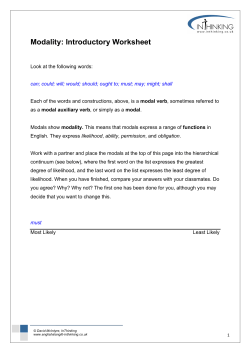
English Modal Auxiliary Verbs: May, Might, Can, Could, Will, Would
Copyright English Modal Auxiliary Verbs May, Might, Can, Could, Will, Would, Shall, Should, Must, Need E-book, 1st edition 2013 Text by Manik Joshi eISBN 978-616-222-243-6 Published by www.booksmango.com E-mail: info@booksmango.com Text & cover page Copyright© Manik Joshi For any query, you can contact at following email address: network@manikjoshi.com No part of this book may be reproduced, copied, stored or transmitted in any form without prior written permission from the publisher. This ebook is licensed for your personal enjoyment only. It may not be re-sold or given away to other people. If you would like to share this book with another person, please purchase an additional copy for each recipient. If you are reading this book and did not purchase it, or it was not purchased for your use only, then please purchase your own copy. Thank you for respecting the hard work of this author. *** 2 English Modal auxiliary VErbs DeDiCation THIS BOOK IS DEDICATED TO THOSE WHO REALIZE THE POWER OF ENGLISH AND WHO WANT TO LEARN IT SINCERELY 3 MoDal auxiliary Verb - May anD Might May And Might Implies Possibility Used To Ask For Permission Used To Give Permission Note - Might is the past equivalent of ‘may’ in indirect speech. But it is used in the same way as ‘may’ to talk about the present or future. Difference between May and Might May denotes more probability/more possibility Might denotes less probability/less possibility It may rain tomorrow (Perhaps a 75% chance) More possible It might rain tomorrow (Perhaps a 50% chance) Less possible Might also denotes ‘would perhaps’ You might attract President’s attention later. (= Perhaps you would attract.) He might have to go (Perhaps he had to go Might is used in ‘conditional sentences’ Might has limitations while ‘asking permission’ Might is very polite and formal; It is not common. It is mostly used in indirect questions. I wonder if I might work on your computer. 4 English Modal auxiliary VErbs use of MoDal auxiliary ‘May’ – 01 Possibility/Probability (In Present And Future) PATTERN (MAY + VERB Word) You may index us for queries regarding donations. Whosever may come and go, there is no difference. He may install camera. It may work this time. His arrest may spell fresh trouble. The long wait may end today. City may not have the roads to drive sports car but it has excellent infrastructure. The tough times may continue in the coming months. They may frame false charges against me. Government may take more steps to curb gold. That stage may come. may take me to a somewhere. It may rain day after tomorrow. It may soon take just four months to recover. One may go for matching the genetic horoscope. We eat that we may live. may go home. State may buy electricity from central pool. 5 (MAY + Auxiliary ‘Have’) We may have a new world out there. It may have at least one virtue. You may have some consolation. You may soon have something to cheer about. (MAY + Auxiliary ‘Be’) May be he came to know something secret and was removed from the post. It may well be. It may also be that ---It may well be a thing of past. He may be brain behind discovery. It may be my own opinion. This may be it. It may be that there is more than one charge. Hidden camera may be subject to well laid out rules. (May + Be + Ing Form of Verb) [Continuous Form] We received information that he may be coming to Singapore to meet her. He a lost battle. You may be making a mistake. He may be weeping. They may well be speaking the truth. Canada may be celebrating better harvest in coming 6
© Copyright 2025





















